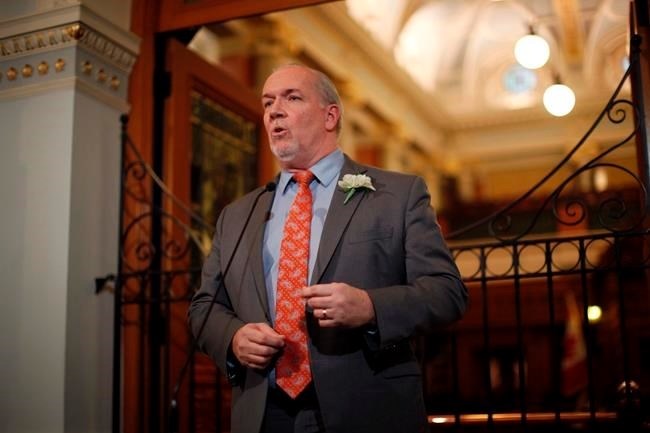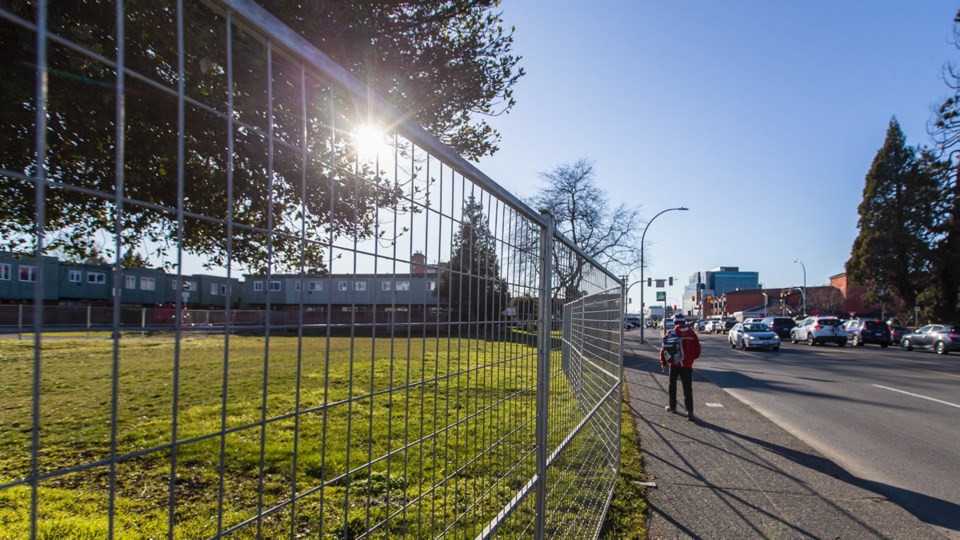An affordable modular housing project in Victoria has been delayed because of a shortage of workers, Premier John Horgan told the Greater Victoria Chamber of Commerce on Tuesday.
It’s a chicken-and-egg sort of problem, with not enough workers to build affordable homes, partly because the affordability crisis has pushed workers out of the capital region, according to industry experts.
A 21-unit modular supportive housing project for Indigenous women, at the corner of Hillside Avenue and Blanshard Street, was set to be complete this spring but has been delayed until December.
“I do share [Mayor Lisa Help’s] concern that the modular housing plan we have in Victoria has been stalled because we can’t find the workers to get the job done,” Horgan said at the chamber’s business leaders’ luncheon.
The government is investing $7 billion in affordable housing over 10 years, Horgan said, but skilled workers are needed to build those units.
“If you’re going to recruit and retain the skilled workers you need … let’s try and focus on not taking too much of our precious land on an island and putting it into houses that no one can afford to live in.”

The delay for the 21 units of housing is more complex than just a shortage of workers, according to the Ministry of Municipal Affairs and Housing.
B.C. Housing had to find another contractor after the original contractor’s price went over budget, the ministry said in a statement.
B.C. Housing signed a contract with a Courtenay-based company, Muchalat Construction, whose workers are tied up with another modular homes project. The company will start construction on the Victoria units in April, the ministry said.
The labour shortage is compounded by B.C.’s unemployment rate of 4.6 per cent, lowest in the country.
A strong economy is a blessing, Helps said, “but we’re not blessed when our economy is still growing and people can’t afford to live here.”
The Victoria mayor points to Seattle, which made massive investments in rental housing and kept building until the vacancy rate got to six per cent, pushing sky-high rents down.
Last fall, the province announced that 588 affordable housing units will be built in Victoria. Helps, chair of the Capital Region Housing Corp., said under Horgan’s government, most affordable housing projects pitched by municipal governments have received funding.
“The money is flowing,” Helps said.
“But it takes a while to get from idea to occupancy and when there’s a shortage of workers, who’s going to build the housing?”
Rory Kulmala, CEO of the Vancouver Island Construction Association, listened to Horgan’s speech and said while labour shortages have long been an issue for construction companies, it’s not the only reason for project delays.
He said municipalities are often to blame for slowing development applications.
The City of Langford is the gold standard for fast approval of housing developments, Kulmala said, something Horgan touched on in his speech when he quipped that municipal governments across the province could look to Langford for a lesson on “how quickly we can get to ‘yes’ on development permits.”
Kulmala acknowledged that many projects are taking longer due to labour challenges.
The association is promoting the construction industry to young people in trying to deal with the shortage of construction workers, he said.
Catherine Holt, CEO of the Greater Victoria Chamber of Commerce, said industries across the region are struggling to find workers.
“It’s the biggest hindrance in our economy, not having enough workers,” Holt said, adding that some have dubbed it a “champagne problem.”
Holt has talked to business owners who can’t extend their hours, are closing one day a week or are relying on a roster of part-time employees because of the labour shortage.
During his visit to Victoria on Feb. 8, federal Finance Minister Bill Morneau talked about admitting the right number of skilled immigrants to Canada to deal with the labour shortage, Holt said. Canada is also experiencing its lowest rate of unemployment, at 5.7 per cent, since 1976, when Statistic Canada began tracking comparable data.
The skills shortage is likely to continue years in the future, Holt said.
“We’re going to have thousands of job vacancies over the next 10 years as baby boomers retire.”



